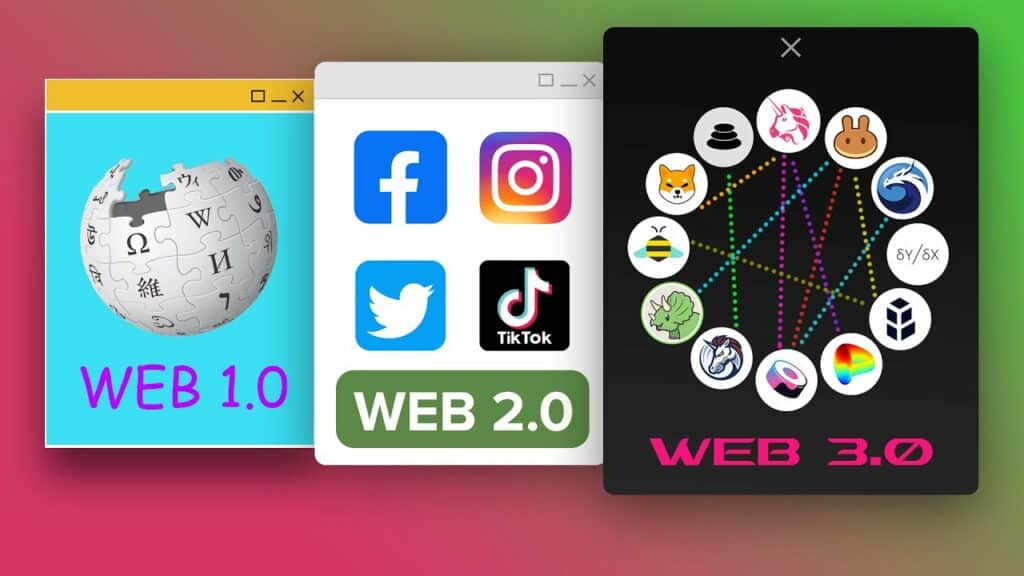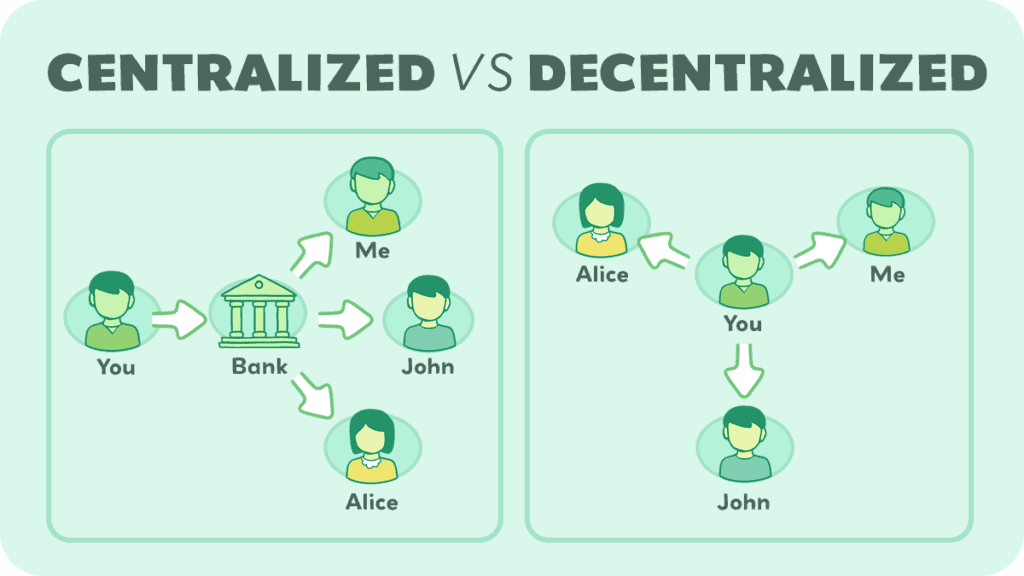So just in case you haven’t watched our first video to 1 million views on the channel, let me explain Web 3 in a few seconds. Web 3 uses the technology of cryptocurrency alongside the current protocols of Web 2.
If that was too simple, Web 3 integrates cryptographic keys to prove ownership of certain digital assets created like websites, or game items, or personal information that’s shared on the internet.
What’s So Bad About Web 2?

Apart from the centralization, Web 2 is actually great, which is why we’ve used it for so long! In fact, what most people call Web 3 didn’t start entering the public thought until a year or two ago with the surge of other new technology like crypto and DeFi.
However, as many users are becoming educated on the downfalls of centralization, they see Web 3 as a solution to avoid big corporations ‘dominating the world’.
The main concerns of Web 2 are that big data companies are constantly collecting and mining information about you, so much so that they know more about you than you do. Even though this data is anonymized, if someone connected it to you, many people could be concerned.
One of the big concepts of Web 3 is online privacy and owning the information that you give to these big corporations.
For example, when you use Google or Facebook, you’re giving up all kinds of data that you may not even think about, from the amount of time you use an app to the location that you’re using it, your data may even be connected with other people’s accounts that are around you, or specifically tagged with things that interest you, like camping or chess or a pet that you own.
What Problem is Web 3 Solving?

So as I just said, the two problems that Web 3 is solving are (1) personal privacy and (2) asset ownership. I’ll cover both of these real quick.
Basically, instead of being attached to an email address like [email protected], I could instead be attached to a specific wallet address, or even a domain that points to that wallet address, from which all of my actions would have to be confirmed by me.
Nobody else could fake transactions, or social media posts, or share things, or act as me—unless they had my private key. Since it’s very easy to create new private keys, and thus new addresses, Web 3 allows people to create many different online identities very easily, and the goal is to not have one company like Google be able to track your every move.
The second part of the Web 3 revolution is asset ownership. So what if you could choose who you sell your private data to? Maybe you have a backlog of a bunch of search history, well normally Google would just own this and sell it to advertisers without you even being asked.
What if you could sell it to companies that you wanted to for $10 or even $50 a month? Maybe you only wanted Chewy.com to see your browsing history, or for Amazon.com to see your purchase history. With Web 3 this could be possible; you could choose who you sell your data to.
Will Everything be Web 3?
It will not and should not be!
One of the biggest problems in the world of crypto is people finding something cool and going “people will use this!” In reality, nobody wants their coin or token or NFT, and even worse, nobody NEEDS it. Since nobody needs it, it’s trying to be a solution to a problem that doesn’t exist.
Web 3 solves a specific problem, and a big part of that problem is ownership of web assets. When you make a tweet, Twitter owns it. When you share a link on Facebook, Meta owns it. And when you post a video on Youtube, Google technically owns it.
I know, it’s my content, but guess what? Google can delete it, they can choose to show it to a billion people, they can give me some money to keep it up and incentivize me to continue making more videos, but even more so, Google *could* change this video.
The technology of Web 3 makes it so that I truly own this piece of video content, not the publishing platform, and one of the ways it could do that is through the use of an immutable blockchain.
Another problem it solves is related to digital identity. There is a very large part of the web that the ideas of privacy and ownership will not be wanted, or needed, and because of this, they won’t be used.
For example, you don’t need to prove you own a dog or who you are if you are simply using Google to view “How much food should I feed my dog?” I mean, if just browsing privacy is what we’re after, we can reach decent privacy without Web 3 technology by simply using something like the Brave Web Browser, or even Chrome with a few extensions, or if we wanted to get really technical, Tor.
In fact, most of the web traffic includes people searching for information like what food to feed their dog, or how much water is in a pool, or what a blockchain is.
It’s basic educational information. The tools that Web 3 offers don’t really add any extra value to that experience. They’re not solving a problem related to that.
Think about it like this: Web 3 will mostly be used on platforms and tools that you originally used an email address and password for.
Instead of using those, you will now use a public and private key to sign and verify things. Things like banks, social media, email accounts—these are places where Web 3 will shine, but there’s one problem. The companies out there that Web 3 works with don’t want Web 3 because it takes away their revenue sources.
Facebook is a company that wants profits, so it’ll integrate Web 3 if it makes the company more money.
In reality, digital ownership usually refers to people owning their data, which isn’t exactly Facebook’s track record, so they’ll probably want to look like they’re letting you own your data without actually giving away the control.
Even more so, do you think Google wants to get rid of their billion dollar advertising machine? Google’s ad tracking and the online privacy of Web 3 don’t really mix well.
Will Web 3 Make Me Rich?

It is of my opinion that Web 3 is very similar to the “dot com boom” where new technology is being established and right now there are a lot of ‘silly’ things.
Do I think my children will be staking their NFTs or logging in to their fridge with a public key? Probably not, but do I think this is the beginning of a decade that will change a lot of how the internet works? Yes.
So back to if Web 3 will make you rich. Using statistics, it will probably not. However, if you’re one of the very few developers who creates something that serves a lot of people, and makes them happy, then it’s very likely you’ll be paid in proportion to the value you create.
In most cases, being early to Web 3 won’t make you rich. You’ll have to put in a ton of work and thought because there are tons of people out there also chasing the money who may be smarter or harder working than you.
Speaking of that, let’s move on to talking about being a Web 3 developer.
How Hard is it to be a Web 3 Developer?
This question is a really interesting one, and one that’s hard to answer. Being a Web 3 developer isn’t really an “easy” or “hard” question, it’s more of a spectrum.
It’s really hard to be a great Web 3 developer, but it’s pretty easy to be an average Web 3 developer; you just have to have a background in programming. The switch from regular programming to Web 3 programming isn’t difficult, it’s just learning a few new ideas, concepts, and syntax.
However, if you have no experience with programming logic, or creating any of your own web programs, even if they were copied from a tutorial, there’s going to be a learning curve.
Once you understand basic program logic, how syntax changes among different languages, and how to Google stuff to make it work, you could probably learn with some homemade projects fairly quickly.
It’s not hard to be a Web 3 developer, but it’s really hard to be a great Web 3 developer.
What Does a Web 3 Developer Get Paid?

Recently, I’ve had the privilege of talking to a bunch of Web 3 developers themselves.
I mean, to answer this question, I could just copy some data from Indeed or Salary.com and share what they have there, or I could even more so go to Reddit and just spit out the same information. But in this article, I want to share real world examples of what Web 3 developers get offered.
Here at WhiteboardCrypto, we have a paid product called WhiteboardCrypto Club where members get access to a ton of premium tutorials that cover over 10 blockchains. Why is this relevant? For people who became either ‘lifetime’ or ‘yearly’ members in 2021, they get a 1 hour phone call with me where we talked about whatever they wanted to.
My calendar was booked full for about five months. Each day I did two calls, one in the morning and one in the afternoon. Due to this, I’ve talked to TONS of people, and some of them have been developers.
I always ask about their salary, their workload, and their current projects to get an idea of what the market is like currently.
I can say that I’ve seen a wide range of salaries out there. Some are for short term $2000 gigs, while others have been $160,000 salaries. The salaried positions are the best because you have a steady income and get to continue to improve your code, while the smaller gigs have hard deadlines and often the codebase requires updates.
Either way, your salary as a Web 3 developer comes down to three main levers.
The first is your skill level, and this is just how good of a developer you are. Surprisingly, this one matters the least; from what I’ve found, you just have to be “good enough” to land the job.
Secondly is the list of projects you’ve worked on and can show. It’s important to be able to show that you have past products, as most employers won’t want to take the chance on a dev when they can select someone else with experience working on a similar project.
Lastly, after having skills and experience, is your ability to market yourself. A large percentage of the people who I’ve talked to that actually got Web 3 jobs got them from either Twitter or LinkedIn. Your ability to market yourself as a good, experienced, and interesting developer is just as important as actually being a good, experienced and interesting developer.
Again, I can’t give you specific numbers on what a Web 3 dev earns, but I can say the better your resume looks and the better you are at marketing yourself, even if you’re an average programmer your income opportunities greatly improve.
It’s fairly easy to get a $60k job, about average to get a $100k job, and if you nail all three points I just mentioned, you can score yourself a $250k+ job. You can follow this link to check current minimum and maximum Web 3 salaries.
Of course, there’s also those outliers out there who develop their own tools or protocols as entrepreneurs and earn millions of dollars per year, but again, those are outliers.
How Far Along is Web 3?
To be fair, you can never judge the duration of something as it is happening. Only when it is finished can you compare where you are currently. With this being said, not many people know about Web 3 technology or the problems that it solves.
Many say the years 2020-2025 will be the “early” years, where devs are working out bugs and perfecting the user experience. The internet was developed only a mere 20 years ago, so it’s easy to see how quickly this technology can grow and advance.
In regards to UnstoppableDomains (UD), they offer the ability to log into different platforms with your Web 3 domain, which is probably one of the largest steps forward. Many decentralized Web 3 domain services, like Ethereum Name Service or Solana Name Service, offer the same thing now.
Imagine logging into a place like Google Cloud or Twitter with your crypto address. UD or the decentralized options don’t have those large integrations yet, but they do have a working system functional on some DeFi protocols like Lens.
Even more interesting, UD released a KYC (know-your-customer) option where you can basically prove you’re a unique individual human, without sharing exactly who you are.
This program is called “Humanity Check,” and is a way to stop bots and fake accounts from performing actions on the blockchain. This is a unique idea and something I’m really excited about.
What Will it Take to Move Everyone to Web 3?
Some people around the world don’t even have reliable internet access yet, so it will be very difficult to answer this question.
To many, claiming a crypto domain is a good first step of ‘ownership’ in the Web 3 space, although it is technically not required. As this technology evolves and it becomes clear how much better it solves problems, it will probably take time and an easier user-interface to see mass adoption.
Can you have Web 3 Without Crypto Coins?
Yes. Minecraft is somewhat decentralized since it’s played by people around the world on servers they host. In other words, Minecraft doesn’t host all the games, people do.
This is a form of decentralization, although not complete, and there are no coins/tokens involved. The code is even open source, so anyone can copy/edit it, and people do all the time—they create their own modifications and plugins and mini games.
Conclusion
As you can see, Web 3 is a very big idea that is still pretty early in the space. It’s still fairly dependent on Web 2 infrastructure, and probably always will be.
Thanks for reading, we hope you enjoyed it, and we really hope you learned something.

